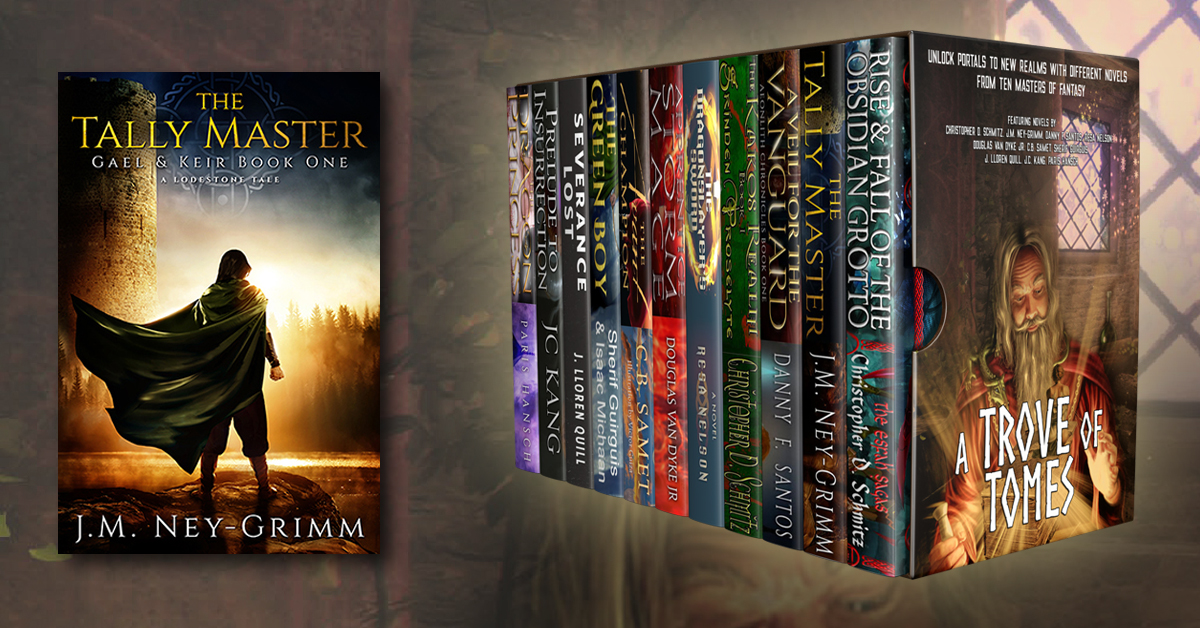 Gael had one more thing to do before he departed for Olluvarde. Something he had to know.
Gael had one more thing to do before he departed for Olluvarde. Something he had to know.
Descending the Regenen Stair, he barely noticed the clear morning light making bright rectangles on the treads where it shone in through the arrowslits. He navigated the clumps of messengers, porters, and scullions thronging the steps almost carelessly. He even failed to perceive that his ankle gave not one single click in his determined plunge toward the kitchens.
The joint should have clicked after his full descent from the top of Belzetarn to his tally room.
He’d met with the regenen on the uppermost battlements, the breeze stirring their hair, the sun warm on their shoulders, and all the Hamish wilds spread out below them: the pine-cloaked hills, rounded and cradling the shining blue of the long lake, with its myriad inlets; the snow-topped Fiorsmarn peaks to the east; the vast forest spreading across ever flattening terrain to the west.
He’d felt free on the battlements, beguiled by the light and the air, persuaded by Carbraes’ effortless authority and composure that all was well, as though they were sovereign and secretarius over a realm of unafflicted men and women and children. As though the truldemagar were nought but an evil nightmare.
If only it were so.
Diving into the traffic on the Regenen Stair—increasingly heavy as the day advanced—dispelled his illusion of freedom immediately.
Curved and elongated noses, line-bracketed eyes, and large cupped ears marred every last troll in the stairwell. Some possessed crooked shoulders, others crooked thumbs. Some pushed their way aggressively through the crowd, others went cringingly.
Gael saw them all afresh, as though he’d just come among them to live, pity and revulsion combined in his breast. Did he descend into one of Cayim’s hells, to be surrounded by gnarled imps?
No. He was one of them himself. This was home. And he wished it were not.
Nor did his errand—unsavory in nature—ameliorate his milieu any.
But he had to know.
He turned into the servery for the Regenen’s Kitchen, as Barris was setting a large tray of mussels—freshly winkled out of their shells—on an adjacent work table. Drifting through the hatch between the kitchen and the servery, the warm scents of roasting hazelnut scones mingled with the dense sweetness of dried cherries stewing and the sharp aroma of vinegar-soaked onions.
Barris looked up from his clams.
“Gael!” he shouted.
An instant later, the cook hurtled over the hatchery counter to grasp Gael by both shoulders, look him up and down, shake him, gasp “Thank Sias you’re okay,” yank him into a rough hug, cuff him on the upper arm, and demand, “What in Cayim’s hells happened to you?”
Gael couldn’t help laughing, in relief as much as surprise. Surely his suspicions were wrong. Unjust, too. How could he possibly accuse Barris of stealing? He would never have accused Arnoll. It had taken seeing Arnoll with a stolen ingot in hand to make Gael doubt him. Barris should be beyond his suspicion too. In fact, Gael never would have doubted Barris, if Arnoll had not proven . . . fallible.
Barris’ urgent concern for his friend was thoroughly reassuring.
And yet . . . despite his surety in Barris, Gael was not quite sure.
He opened his inner sight. Tiamar be praised! Neither of Barris’ hands bore the energea lattice that Gael had deployed in the hidey-hole of the clogged latrine.
“Sias in paradise!” Barris babbled. “We heard you’d picked a fight with the First Brigenen. We heard he’d picked a fight with you. The castellanum’s notarius said you’d been tapped as the first combatant in the brigenen’s gladiatorial ring. The scullions said you’d been pushed over the balustrade of the top balcony of the high great hall and killed. The march’s notarius said nothing had happened at all. The hospital scullions reported you’d been gravely injured. Sias, Gael! I’ve been worried!”
“I should have sent a messenger, of course,” said Gael. “But I was out of my senses at first, then being treated—most competently, I assure you—and then asleep. I do apologize.”
Barris jutted his chin. “The bruises on your neck tell me it wasn’t nothing,” he said.
“No,” Gael agreed. “We did fight, and I was injured. Rather badly, I’m afraid, but Keir fixed the damages. The boy was training for a healer before he came here, did you know?”
Barris started to reply, stopped, then said, “Wait right here.”
The cook nipped back into the kitchen through the door beside the hatchery, placed a decanter, a goblet, a covered dish, and a soup spoon on a tray, grabbed a tall stool, and returned to the servery with them. He set the tray on the hatch counter, placed the stool beside it, and gestured Gael to sit.
“You should still be resting, not clomping up and down the tower stairs,” he said almost angrily.
“I’m very well, Barris. Truly,” Gael assured him.
Barris just glowered, his brown eyes smoldering.
Gael smiled ruefully and sat. “You’re quite right, of course. I am healing well.”
“Um hm,” said Barris, pouring from the decanter into the goblet—was that knotberry mead? at this hour of the morning?—and removing the cover from the dish to reveal minced parsnips, celeriac, and tidbits of fish in a light broth. The fragrance of the steam rising from the chowder made Gael’s mouth water. He dipped his spoon full, inhaled blissfully, and brought the spoon to his lips. The first mouthful was delicious, warm and soothing, earthily sweet, and mellow.
“Dreben picked no fight with me,” Gael explained. “And I picked none with him. It was a mutual craving. I think.”
“Sias! What got into you?” breathed Barris, leaning against the hatchery side wall.
Gael considered his answer. He had no desire at all to describe the original provocation for his rage against the brigenen. If Barris had never seen the execution of a Ghriana spy, better he remain ignorant of the reality. And if he had, better he not be reminded.
Truly, it was the theft from the tally room that had Gael more vulnerable to his emotions—worry, discontent, wrath—than usual. And that theft was why he sat here now, sipping Barris’ wonderful fish chowder.
“Someone is stealing my tin,” he said abruptly.
Barris paled, his skin suddenly bedewed by a sheen of moisture, his eyes shifting and full of guilt.
Gaelan’s tears. It was Barris, after all.
Gael swallowed his mouthful, paused a moment, and then asked, very gently, “Barris, what really happened yesterday morning, when you fed smoked fish to me, to Keir, and to the privy smithy scullion?”
The cook seemed to be tongue-tied.
“It is best you tell me,” said Gael softly.
Barris moaned. “Thea, Iona, and all the handmaidens of Sias in paradise,” he whispered. “I’m sorry, Gael. I’m so sorry.”
“Say it,” Gael directed.
“I took it, so help me, I took your tin,” said Barris lowly.
“Why?” asked Gael. Gaelan’s grief, but he couldn’t imagine what might have provoked his friend to such an act, any more than he’d been able to understand Arnoll’s motivation before the smith had revealed it. What other secrets of Belzetarn was he about to uncover?
Barris choked, again speechless.
Gael glanced hurriedly around the servery. It was deserted at the moment, but a scullion was sure to enter soon, pursuing some errand. And if a scullion failed to materialize, one of the other cooks would poke his head through the hatch with a question.
“We should not be overheard,” murmured Gael.
Barris nodded, infinitesimally.
“Where can we go without drawing undue attention?” asked Gael, voice still low.
“Mead cellar,” said Barris, barely audible.
Gael picked up his goblet of knotberry mead, sipped, and then exclaimed quite loudly, outraged, “Opteon, your mead is vinegar! Has the cellarer failed to store the new barrels at the back, failed to bring the older ones forward?”
Barris made the expected reply. “Sias forfend!” he roared, voice steady enough despite the anguish on his face. “I’ll see for myself this instant!” Finding enough anger in his pretense, he stuck his head back through the servery hatch. “Lodis, take over for me for a bit, will you? I need to assay the latest opened cask in the cellars.”
Lodis yelled back, “I have the hearth,” and then Barris led the way down the Regenen Stair to its very bottom, where the last few treads formed a tight alcove beneath their surfaces, sheltering only dust and shadow.
The servery providing for the bottle scullery and the cellar was dim and very quiet. Barris crossed the narrow space in five swift strides, his clogs clopping on the cold stone as he pulled his fibula of keys from his apron pocket. A quick twist of his wrist, and he had the meadery door unlocked.
Gael allowed the cook to usher him through. He avoided glancing at Barris’ face—not wanting to see his friend’s likely discomfiture—as he walked into the vaulted space. It reached far, far back, lit by a series of barred, arched openings placed near the top of its outer wall. Great barrels rested in cradles throughout, while smaller casks occupied racks along the edges.
Barris walked around the first rank of barrels to where a low ledge protruded below one of the barred windows. The fragrance of scythed grass floated in from the artisans’ yard, along with the shouts of an opteon reprimanding a careless apprentice.
Barris hunkered down in the ledge like a scullion being disciplined, his elbows on his knees, staring at the floor. Gael lowered himself beside his friend. Now that they were here, now that they could speak freely, Gael found he didn’t want to speak at all, didn’t want to ask any questions, didn’t want to know . . . anything that Barris might tell him. If dwelling in a troll citadel inevitably resulted in broken loyalties, then Gael didn’t want to dwell in one. He rather thought he hated Belzetarn. But, then, he always had, hadn’t he? From the very beginning.
Reluctantly, Gael shifted sideways to better view his friend.
Barris still stared at his feet, his back hunched, and his hands clutching his hair.
“Well?” demanded Gael, his voice hard.
Barris jerked upright, and started to talk, his words low and dull.
“Theron threatened to hurt the kitchen boys, if I didn’t get him some tin. He said he needed it for leverage, bribes and such. I didn’t want to do it, but”—his voice cracked—“I couldn’t let the boys be harmed.”
Gael sighed. Of course Barris would protect his scullions. They were like sons to him, and like a father, the cook admonished them, guided them, pushed them, shielded them, and loved them. Barris knew boys—with all their impetuosity, irresponsibility, eagerness, and unthinking brutality. He understood them, and managed them well, but his care for his underlings had proved the weakness by which the castellanum could snare him.
Gael sighed again, listening to the hectoring from the yard, still murmuring through the opening in the wall above them. “Why didn’t you come to me?” he asked. “You know I have the regenen’s ear. I could have ensured the castellanum did nothing to the boys.”
Barris looked back down at the floor. “I couldn’t risk it. He’s too tricky. He’d sniggle through with bits of abuse somehow, you know he would.”
“So, instead you stole from me?” Gael could hear his pitch rising. Something didn’t add up. That Barris would do much to preserve his boys was consistent with his character, if the threat were sufficient. But that Barris would betray his close friend and his own integrity to save the scullions from a few whippings or overly forceful reprimands . . . that didn’t add up. “Really, Barris? Really?”
The cook buried his head in his hands. “I know. I know. I’m a ratfink. An arsewipe. A scumbucket. I hate myself.” His voice fell under his self-contempt, ringing true to Gael’s ear.
Gael abruptly felt very tired. What in Cayim’s hells was he going to do about this, just on the verge of his departure for Olluvarde? He’d have to tell Keir, of course. But the wise course for dealing with Barris eluded him. He heartily wished he’d left the matter until he returned.
“How did you manage it?” he asked wearily, almost against his will.
Barris sat back, slumped against the wall. “Jemer was always late, always grabbing a quick bite from me on his way from the vaults to the privy smithy. He would thump his carry sack down on the hatch counter. All I had to do was hold the tray of food over it, and rummage under the flap while Jemer stuffed his face.” Barris shook his head. “Hells, Gael. I’ll understand if you never want to speak to me again.”
“Don’t steal anymore. Hear me?” said Gael.
“Theron already said to wait until you were back before I took another ingot,” said Barris, defeat in his voice.
Gael pursed his lips, thinking. If the castellanum’s scheme—whatever it was—required Gael’s presence, then it seemed likely that its goal must be to Gael’s detriment, not the mere bribes and influence-peddling that he’d told Barris.
“How many have you taken thus far?” he asked. “And for how long?”
“Ten,” answered Barris, “starting last year. Theron stepped up the pace just this deichtain. I don’t know why.”
Hells! This was much worse than Arnoll’s one-time theft, confessed almost immediately after it transpired. Barris had been deceiving Gael for moon upon moon. How many more of his acquaintance would turn out to be stealing from the tally room? The next thing he knew, he’d be hearing Keir confessing. Except that was ridiculous. If it were Keir, the boy need only have fudged the tallies to ensure that Gael never learned there were metals missing at all.
“Did you only steal tin?” he asked. “Never bronze?”
“Bronze?” Barris frowned, looking puzzled. “No, never bronze.”
So. Gael had yet to find every last thief.
“Barris, I can’t see my way in this.”
“I’ve made a right mess for you,” said his friend bitterly. Was Barris still his friend? Gael had no idea how he felt about it at this point. He’d have to sort that out later.
“Don’t steal anymore,” Gael repeated. Barris had said he would not, but somehow Gael felt a need to emphasize that instruction. “Stay away from Theron as much as you possibly can. Just do your cooking. In fact, do even more cooking than you usually do. Plan immense feasts to celebrate . . . anything at all. And wait until I return from Olluvarde.”
Barris looked stricken. “No,” he said. “Turn me in. I deserve it. Carbraes will order me flogged. Or worse. And then I’ll rot in the brig until I die.”
Gael huffed an impatient breath. “I’m not turning you in, Barris. You’ve been my friend—a staunch friend—for years before you did this. Just . . . do right while I’m gone, eh. We’ll figure this out.”
Barris stared back at him, eyes haunted, saying nothing at all.
* * *
Next scene:
The Tally Master, Chapter 14 (scene 64)
Previous scene:
The Tally Master, Chapter 13 (scene 62)
Need the beginning?
The Tally Master, Chapter 1 (scene 1)
* * *
Buy the book:
The Tally Master
 Gael’s cavalcade of thirteen trolls and sixteen horses made good progress en route to Olluvarde. None of their mounts or pack animals fell lame, the weather stayed fine, and such luck as persisted among trolls permitted them to set up camp each evening without petty hindrance and to break camp in the dawning as swiftly.
Gael’s cavalcade of thirteen trolls and sixteen horses made good progress en route to Olluvarde. None of their mounts or pack animals fell lame, the weather stayed fine, and such luck as persisted among trolls permitted them to set up camp each evening without petty hindrance and to break camp in the dawning as swiftly.


 The Dragon Princess
The Dragon Princess  Grinden Proselyte
Grinden Proselyte  The Dragonslayer’s Sword
The Dragonslayer’s Sword  The Tally Master
The Tally Master 
